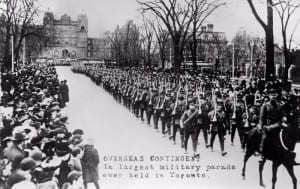Manliness and militarism: Educating young boys in Ontario for war (2001)

First World War, 1914-1918. Parade of troops before leaving. University Avenue, looking north to Queen's Park. Photo is public domain: Courtesy of Toronto Public Library.
In Manliness and militarism: Educating young boys in Ontario for war (2001), Mark Moss speaks of a tradition of comparing hunting to warfare. Since antiquity, according to Moss, hunting has been viewed as a war game which served the purpose of preparing young boys for combat.
In the author’s view, hunting was seen, in the period between 1867 and 1914, as a definitive way to harness what in the British empire were viewed as supreme male attributes including courage, staying power, resourcefulness, and mastery over the environment and nature. Many influences have, he notes, at different times served to prepare communities around the world for war.
From 1867 to 1914, the period covered by Moss’s study, converging influences — including hunting; sports as in football, hockey, and boxing; public and private schools; military drills in schools; military monuments; popular fiction; and the Boy Scouts movement — promoted a positive attitude about war, according to Moss, who adds that when Canada entered the First World War, young men in Ontario viewed the opportunity to enlist in positive terms. As Moss notes, however, the book is not a study of the causes of war, nor is it a military history of the First World War.
To assist in placing the book into context, the following brief review in Project Muse may be noted:
“The book features exhaustive research from wide-ranging primary sources and well-chosen quotations from international writers on the period. Yet there is a pervasive presentism that reduces much of the argument to hindsight, portraying Ontarians in the first decade of the 1900s as actively anticipating the coming of war. Evidence does not bear this out. In his conclusion, Moss states, “It is not too much to claim that, by 1914, most aspects of young men’s lives were oriented towards the military” Why, then, were so few serving before the outbreak of the war? In reality, the total August 1914 strength of the Canadian military surely speaks to a long tradition of neglect rather than a veneration of militarism.”
The above-noted excerpt is from a review by Andrew Theobald in the University of Toronto Quarterly, Volume 75, Number 1, Winter 2006. Theolbald is author of The bitter harvest of war: New Brunswick and the Conscription Crisis of 1917 (2008).
Many books are available concerning Canada’s role in the First World War; among recent ones are Shock troops: Canadians fighting the Great War, 1917-1918 (2008) by Tim Cook.

Leave a Reply
Want to join the discussion?Feel free to contribute!